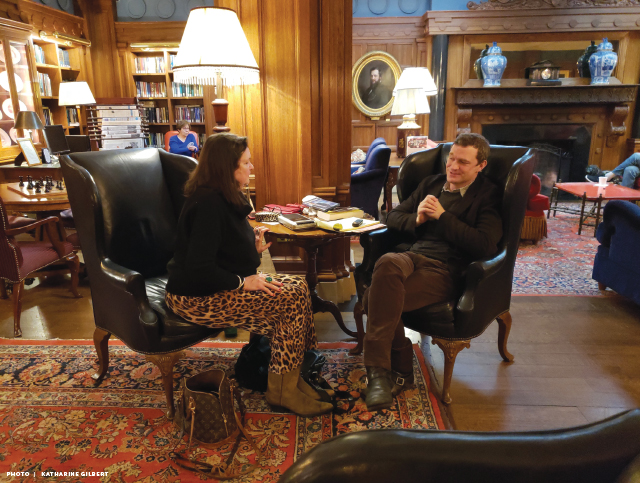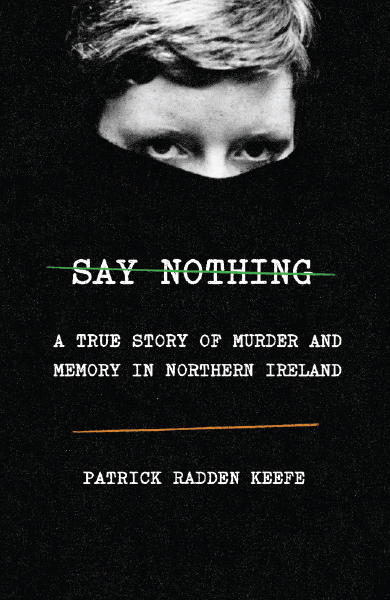By Sabina Clarke
Recently I met with Patrick Radden Keefe the amazingly gifted author, investigative journalist and staff writer for The New Yorker since 2012 and contributor since 2006. His latest book Say Nothing out now and getting rave reviews examines the horrific death of Jean McConville, a mother of ten, against the backdrop of the turbulent period in Irish history known as ‘The Troubles.’
“Ireland is a great country for storytelling. I wanted to write a book that could function as a rigorous history of this period and draw in new readers who are not familiar with ‘The Troubles’ and have never been to Belfast and those who have some familiarity but would like to know more.”

Radden Keefe who is of both Irish and Australian ancestry has always wanted to be a writer since childhood but “didn’t quite know how to do it and pay the rent.” He started writing in Law School and published his first book at age 29 after he passed the New York State Bar Exam.
In 2013 intrigued after reading The New York Times obituary of Irish Republican Army volunteer Dolours Price, the former wife of Irish actor Stephen Rea, Keefe made two trips to Belfast researching Price’s life and interviewing Jean McConville’s grown children documenting the trauma felt by each of them on the night their mother was forcibly abducted from her home at gunpoint never again to be seen alive.
With the overwhelming response to his mesmerizing account “Where the Bodies Are Buried” that appeared in The New Yorker in 2015, he was prompted to consider writing a book with McConville’s murder as its starting point. So he made seven trips to Northern Ireland and conducted more than 100 interviews over four years researching Say Nothing — the title taken from a Seamus Heaney poem quoting an old Irish phrase “Whatever you say, say nothing” — “O land of password, handgrip, wink and nod.”
Almost simultaneously the unsolved Jean McConville murder case was being resurrected with the exposure of a closely guarded secret — the existence of The Boston College Belfast Project — the oral history archive of ‘The Troubles’ stored in the Burns Library at Boston College only to be subpoenaed and seized by the Police Service of Northern Ireland under the Mutual Legal Assistance Treaty, MLAT, between the U.S. and the U.K. on the grounds that it was needed to investigate a murder — the forty-year-old unsolved murder of Jean McConville whose remains had finally been found on a deserted beach.
The Boston College Belfast Project became an international story-making headlines around the world. Appeals to deny the seizure of the archives by Boston College and author and journalist Ed Moloney, director of the Boston College Belfast Project, and Dr. Anthony McIntyre, who conducted the interviews with former IRA members in Ireland, went on appeal to the U.S. Supreme Court and the High Court of Belfast. The target was Gerry Adams and the seizure of Dolours Price’s interview relating to the McConville murder.
In Say Nothing, Keefe paints a masterful and historically accurate portrait of ‘The Troubles’ ascribing equal blame to both the loyalist and nationalist communities with a nod to the main antagonist and instigator — the British State — for the bloodshed and horrific human toll extracted by the war.
But what is so gripping about his work is the style in which it is written. Keefe calls it narrative non-fiction. It is reminiscent of the style invented by Truman Capote, the ‘non-fiction novel’ in his riveting account of the murder of the Clutter family in Kansas.
But Keefe goes a step further by skillfully and accurately weaving McConville’s murder into the larger canvas — the historical background of ‘The Troubles’ in a way that can be easily grasped by the novice reader with no prior knowledge of this period in history. He does this expertly without sacrificing any degree of scholarship in a telling that rivals the best crime novel.
In his riveting and perceptive portraits of IRA volunteers — Brendan Hughes, Dolours Price and her sister Marian Price, he brings home the huge personal toll the war took on each of their lives and their complete inability to cope when the war ended in a compromise rather than with their goal of the end of British rule in Ireland.
For them, the Good Friday Agreement was a sell-out. But Keefe suggests a more painful reality — that perhaps there was no longer a role for them to play and “they were left behind by history” rather than being tossed aside and no longer needed by Gerry Adams — on whom they turned with bitterness and a surprising degree of revenge. To his credit Adams never reciprocated.
Of the three people who were with Jean McConville when she died, Keefe dons his hat as a superb investigative journalist and identifies, without a trace of doubt, that the triggerman was Marian Price — the sister of Dolours Price. Through her attorney Marian Price refused to speak with Radden Keefe and denied any involvement — which he thinks is telling.
Another pivotal iconic figure in the history of ‘The Troubles’ — Bernadette Devlin McAliskey — also refused to be interviewed by Keefe who observed that the past in Belfast is very much in the present adding “A culture of silence suppresses any real dialogue. It stretches back decades. People involved in the republican movement were very circumspect about talking about their experiences.”
And of course, Gerry Adams refused to give an interview to Keefe. But then why would he? And Keefe says as much. Nothing to be gained and much to lose. Despite this, Keefe’s portrait of Adams may be one of the best I’ve read — “He is an endlessly fascinating guy — intriguing and a bit of a riddle. I have done my best to understand him but I don’t think anybody is able to totally get him.” Also insightful are his deft and perceptive portraits of both Dolours Price and Brendan Hughes — all three loom large in the book.
As to whether Jean McConville was an informer, Radden Keefe says “It would be heedless for me to say for sure that McConville was an informer. I lay out the evidence. Her children say she was not. The Ombudsman says she was not. Ed Moloney and Brendan Hughes say that definitely she was. I am not as certain.”
As for the preoccupation by some with Adams’ purported membership in the Irish Republican Army, and his abandoning his comrades by his denial — I find this puzzling since admitting to even a brief stint in the IRA would mean immediate imprisonment — and this for a man who delivered the peace and dedicated his life to the promise of a free and united Ireland. “Yet, because of this,” noted Keefe, “his legacy will be more complicated.” The Irish can be an unforgiving people.
In conclusion, Keefe makes a valid argument for a Truth and Reconciliation Process as established in South Africa with immunity granted. Then past crimes can be permanently put to rest and the present finally liberated.
About the Author: Patrick Radden Keefe grew up in Dorchester, Massachusetts and received his undergraduate degree from Columbia where he majored in Modern European History and wrote his thesis on World War I. He earned a law degree from Yale Law School, a Masters in Philosophy in International Relations from Cambridge University and a Masters in Science from the London School of Economics. He has received many fellowships including those from the Marshall Scholarship Foundation, Guggenheim Foundation, the Woodrow Wilson International Center for Scholars, and the Cullman Center for Scholars and Writers at the New York Public Library. He was a policy adviser in the Office of the Secretary of Defense between 2010 and 2011.
Say Nothing
By Patrick Radden Keefe
Penguin Books
New York, NY
2019, $28.95


